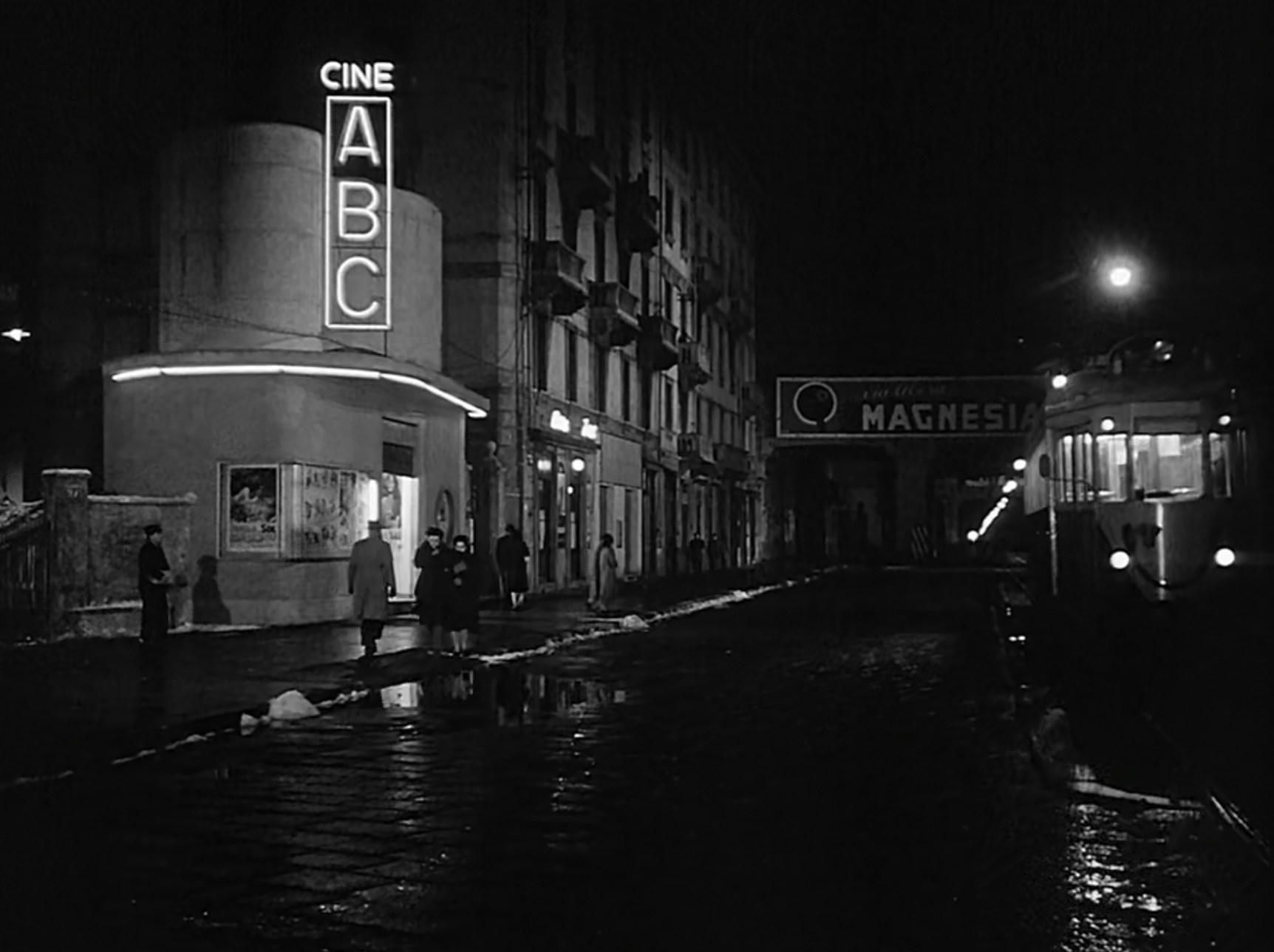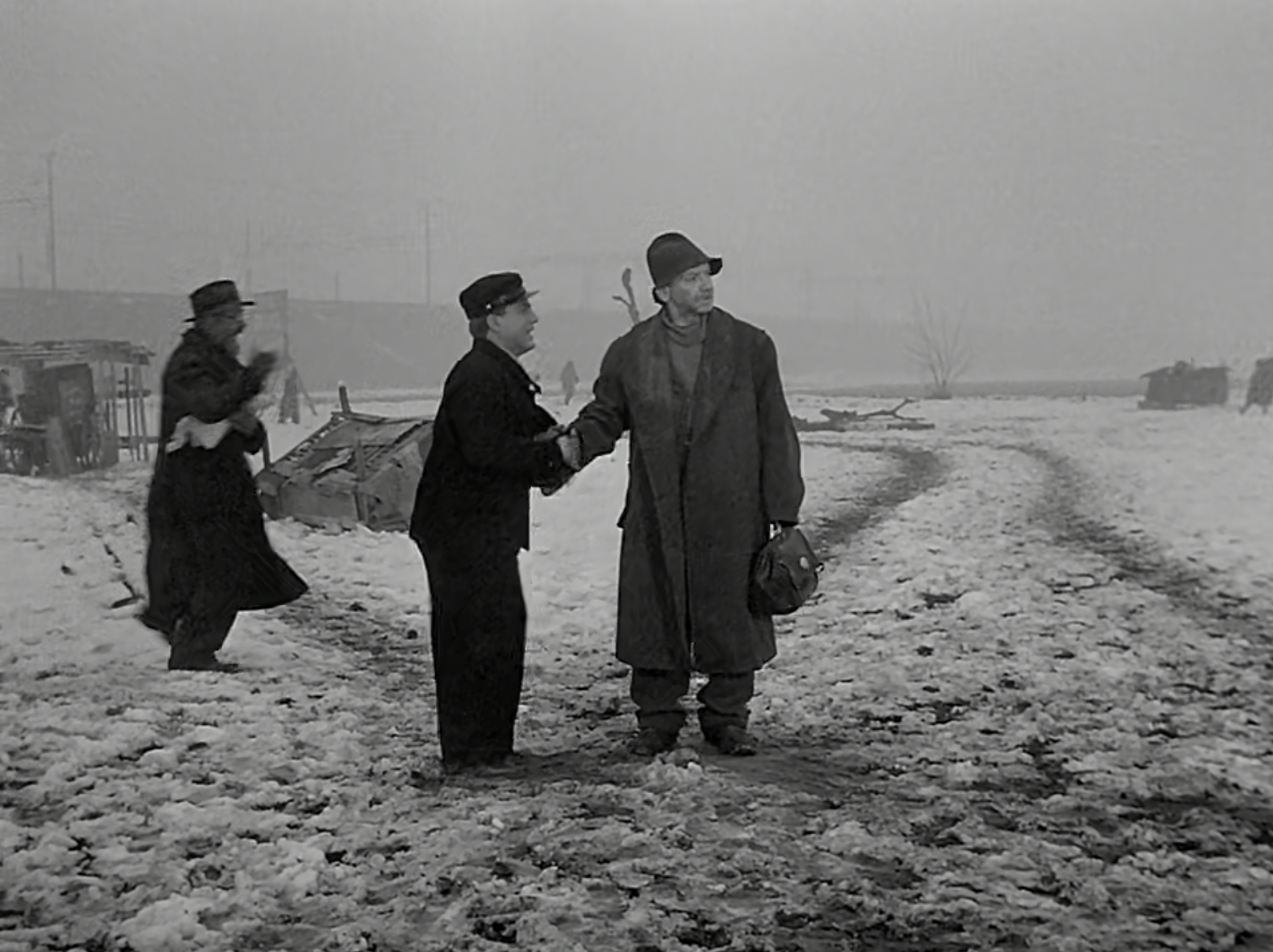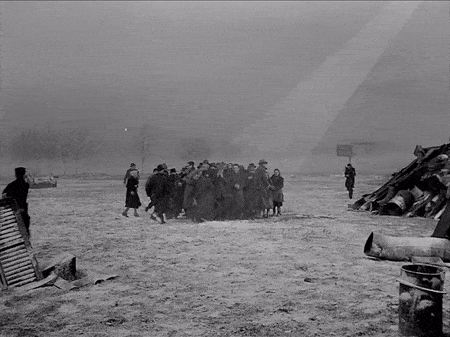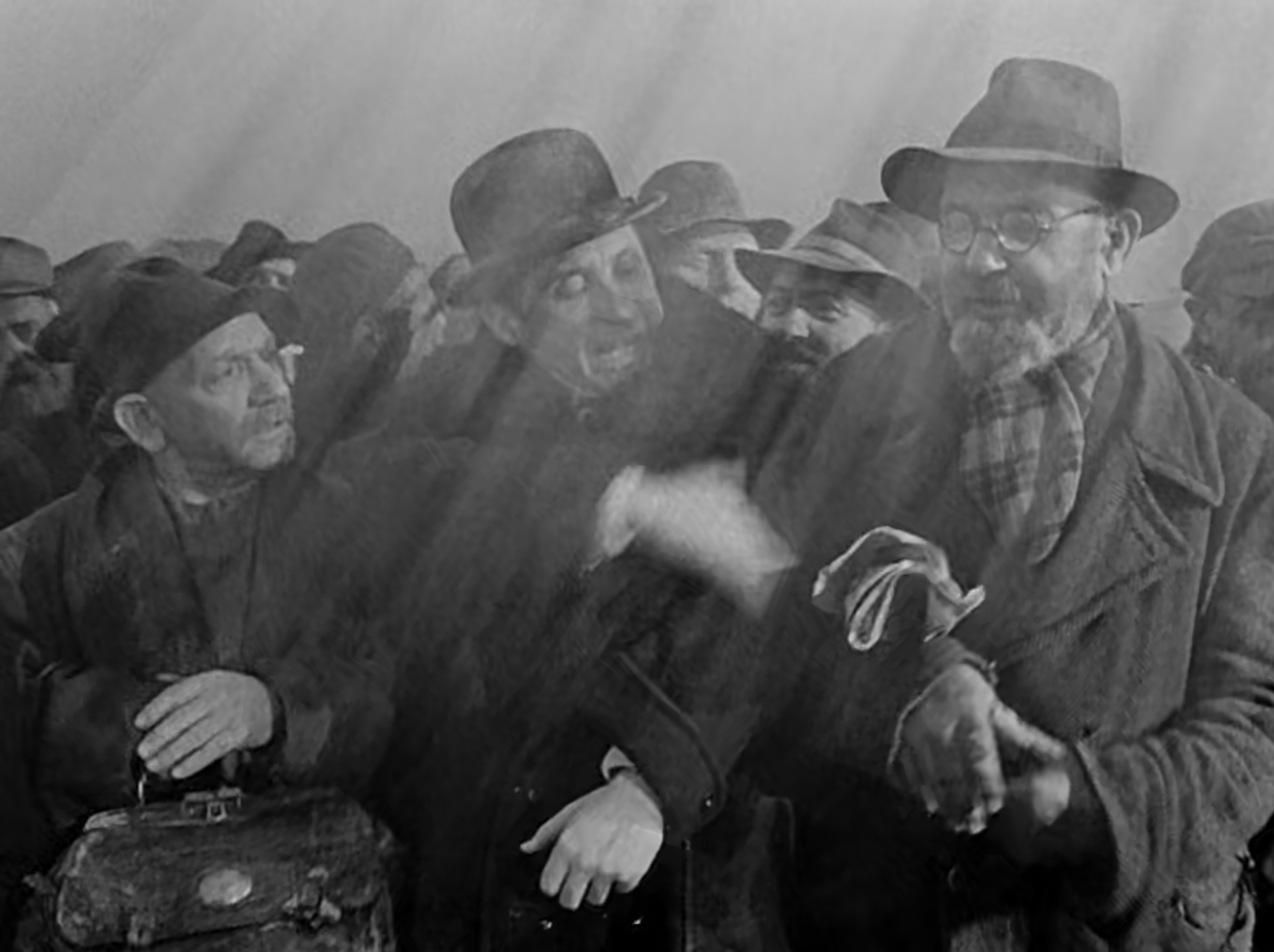Regia / Director: Vittorio De Sica, 1951
Ancora una volta, Totò è sotto l'alto arco dell'orfanotrofio, affiancato da due uomini in abito scuro. Ma questa volta è un giovane adulto. Il trio esce in strada. Poi i compagni di Totò gli stringono la mano, gli danno una pacca sulla spalla e lo salutano.
Once again, Totò is beneath the tall archway at the orphanage, flanked by two men in dark suits. But this time he is a young adult. The trio steps out into the street. Then Toto’s companions shake his hand, pat his shoulder and wave goodbye.
Ci sono piccoli cumuli di neve per terra. Totò sembra portare ancora la borsa che aveva quando è entrato: i suoi averi non sono aumentati nel frattempo.
Allegramente, dice "Buongiorno!" al primo uomo che incontra, che non risponde.
There are small mounds of snow on the ground. Totò seems still to be carrying the bag he had when he went in: his possessions have not increased in the interim.
Cheerfully, he says “Good morning!” to the first man he encounters, who doesn’t respond.
L'uomo guarda mentre Totò si dirige nella piazza animata, che è nebbiosa e coperta di neve.
The man watches as Totò heads into the bustling square, which is misty and coated with snow.
Taking off his cap, he greets another passerby, who says “Good morning” in return, but hurries on, without pausing.
Togliendosi il berretto, saluta un altro passante, che ricambia con un "Buongiorno", ma si affretta a proseguire, senza fermarsi.
Il terzo uomo che saluta risponde in dialetto milanese: "A chi stai dicendo 'buongiorno'?"
The third man he greets responds in Milanese dialect, “Who are you saying ‘good morning’ to?”
"A lei!"
"A me?"
"Sì!"
"Ma lei mi conosce?"
"No”.
"Allora cosa intendeva dire con questo 'buongiorno'?"
"Volevo dire veramente: 'buongiorno'".
“To you!”
“To me?”
“Yes!”
“But do you know me?”
“No.”
“So then what do you mean with this ‘good morning’?”
“I truly meant: ‘good morning.’”
L'uomo alza il braccio in segno di disgusto e se ne va borbottando, mentre Totò rimane a guardare, chiedendosi, senza dubbio, in che tipo di mondo stia entrando.
The man throws up his arm in disgust and storms off muttering, as Totò stands and watches, wondering, no doubt, what kind of world he is entering.
Totò si affaccia al suo futuro in questa splendida composizione di elementi semplici – i massicci edifici che si sciolgono nella nebbia, una squadra di operai con la schiena piegata, alcuni pedoni e un sentiero tracciato nella neve per Totò, che gli mostra la strada.
Totò faces his future in this gorgeous composition of simple elements – the massive buildings melting into the mist, a team of workers with bent backs, some pedestrians, and a path worn through the snow for Totò, showing his way forward.
Si avvicina agli uomini che gemono per lo sforzo di posare i binari del tram.
He walks over to the men, who groan with the effort of laying tram tracks.
Posando la sua borsa sull’asfalto bagnato, con il suo berretto sopra, Totò va ad aiutare.
Setting his bag down on the wet pavement, with his hat on top, Totò goes to help.
Sta per riprendere il suo viaggio, quando vede il caposquadra che prende appunti. Correndo lì, Totò chiede: "Scusa, c'è lavoro?"
"No", dice l'uomo schiettamente.
About to resume his journey, when he sees the foreman taking notes. Running over, Totò asks, “Excuse me, is there work?”
“No,” the man says bluntly.
Imperterrito, Totò continua a camminare, con il sorriso.
Undaunted, Totò walks on, with a smile.
Una dissolvenza porta la notte: piccole luci emettono un bagliore nebuloso.
A dissolve brings on the night: tiny lights cast a hazy glow.
Notando un gruppo riunito sotto un portico, Totò va a indagare. Si infila tra la folla, che guarda intensamente le persone eleganti che escono dal Teatro alla Scala.
Noticing a group gathered under a portico, Totò goes to investigate. He squeezes in among the crowd, who gaze intently at the elegant people emerging from the La Scala Opera House.
Posando di nuovo la borsa, Totò applaude con entusiasmo. Uomini col cappello a cilindro e donne con la tiara annuiscono gentilmente, hanno il diritto di essere apprezzati solo per essere ricchi ed eleganti.
In piedi dietro Totò, un uomo guarda la sua borsa.
Setting down his bag again, Totò applauds enthusiastically. Men in top hats and women in tiaras nod back graciously, entitled to be appreciated just for being rich and elegant.
Standing behind Totò, a man looks down at his bag.
L'uomo – Alfredo (Arturo Bragaglia) – si china e si allontana senza fretta con essa.
The man – Alfredo – reaches down and walks away unhurriedly with it.
Quando Totò guarda giù, tutto ciò che vede sono le mattonelle quadrate.
When Totò looks down, all he sees is the tile squares.
Ma individua l'uomo che si sta allontanando con la sua borsa.
But he spots the man walking away with his bag.
Totò comincia a seguirlo.
Totò starts to follow him.
Nella Galleria Vittorio Emanuele II, due file di luci in alto guidano il cammino di Totò, restringendosi in lontananza.
In the Galleria Vittorio Emanuele II, two lines of overhead lights guide Totò’s way, tapering into the distance.
Attraversa i binari del tram e si dirige verso il cinema ABC, raggiungendo gradualmente il ladro.
He crosses the tram tracks and heads toward the ABC Cinema, gradually catching up to the thief.
Alla fine tocca delicatamente la spalla dell'uomo: "Scusi. È la mia!"
Alfredo guarda pensieroso la borsa.
At last, he gently touches the man’s shoulder: “Excuse me. That’s mine!”
Alfredo looks down at the bag thoughtfully.
"La sua?"
"Sì”.
Alfredo posa delicatamente la borsa.
“Yours?”
“Yes.”
Alfredo delicately puts the bag down.
Dà alla borsa un ultimo sguardo triste e affettuoso e si allontana lentamente, fermandosi a guardare indietro con rammarico.
He gives the bag one last sad, fond look and slowly walks away, stopping to gaze back with regret.
Si ferma davanti a una recinzione in ferro battuto e appoggia la testa sulle sbarre. Totò raccoglie la borsa, si avvicina e tocca di nuovo la spalla dell'uomo.
He stops at a wrought-iron fence and hangs his head on the rails. Totò picks up the bag, walks over, and touches the man’s shoulder again.
Alfredo si gira, addolorato. Totò lo rassicura: "C'è dentro quasi niente".
"Ma a me piace la borsa", singhiozza.
Alfredo turns around, grieving. Totò reassures him, “There’s hardly anything in it.”
“But I like the bag,” he sobs.
Totò apre la borsa, tira fuori i suoi pochi averi – vestiti e un ritratto incorniciato di Lolotta – poi gli consegna la borsa. L'uomo lo guarda felice, con gli occhi che brillano.
"Grazie”.
"Prego”.
Totò opens the bag, takes out his few possessions – clothing and a framed portrait of Lolotta – then hands the bag over to him. The man looks at him happily, eyes sparkling.
“Thank you.”
“You're welcome.”
Un tram passa, una bolla di luce nell'oscurità.
A tram passes by, a bubble of light in the darkness.
Totò chiede ad Alfredo: "Dove si può andare a dormire?"
"Bisognerebbe andare in centro. Ma l'ultimo tram è già andato via".
Totò asks Alfredo, “Where could I go to sleep?”
“You should go to the city center. But the last tram has already left.”
Alfredo propone: "Potrei ospitarla a casa mia, se lei crede…"
"Grazie!"
"Andiamo allora!"
Camminano lungo il vicolo, incorniciato dalla neve e dalle file di edifici.
Alfredo offers, “I could put you up at my place, if you think...”
“Thank you!”
“Let’s go then!”
They walk down the alleyway, framed by the snow and by rows of buildings.
Mattina: baracche improvvisate sono disperse sul campo innevato. Delle figure camminano intorno ai loro semplici ripari. Si sente il fischio di un treno.
Vediamo due teste emergere da un piccolo arco di metallo ondulato: sono Totò e Alfredo.
Morning: makeshift shanties are dispersed on the snowy field. Figures walk around their simple shelters. A train whistle is heard.
We see two heads emerge from a small arch of corrugated metal: it’s Totò and Alfredo.
Strisciano fuori nel freddo pungente. Alfredo, senza cappello e calvo, porta la borsa.
They crawl out into the bitter cold. Alfredo, hatless and bald, is carrying the bag.
Tremando, battendo i piedi per scaldarsi, i due si stringono la mano mentre Totò ringrazia il suo anfitrione.
"Il sole!" arriva un urlo improvviso. "Il sole!"
Shivering, stamping their feet to keep warm, the two shake hands as Totò thanks his host.
“The sun!” comes a sudden call. “The sun!”
Un ampio fascio di luce solare illumina il terreno gelido. Una dopo l'altra, le figure si affrettano a entrare nel suo calore e si accalcano.
A broad beam of sunlight lights up the frigid ground. One by one, figures hurry into its warmth and crowd together.
Alfredo e Totò le seguono.
Alfredo and Totò follow them.
Spintonandosi e battendo i piedi, gli abitanti della baraccopoli gemono e cantano con soddisfazione godendosi il sole dentro questo piccolo cerchio di calore.
Jostling and stamping their feet, the shantytown inhabitants moan and sing with contentment, enjoying the sun inside this small circle of warmth.
"Che piacere, eh?" dice Alfredo, e Totò risponde con un gran sorriso.
“What a pleasure, isn’t it?” says Alfredo, and Totò responds with a big smile.
Un ritardatario che indossa una bombetta e un cappotto con un collo di pelliccia – Rappi (Paolo Stoppa) – cerca di infilarsi sgridando gli altri: “Non spingete!”
A latecomer wearing a bowler hat and a coat with a fur collar – Rappi – tries to squeeze in scolding the others: “Don’t push!”
Ammassato tra la folla, lui fa mostra di spolverarsi.
"Mandalo via!" grida qualcuno.
Packed into the crowd, he makes a show of dusting himself off.
“Kick him out!” someone yells.
Costretto a uscire, fissa il gruppo, indignato e ferito.
Forced out, he stares back at the group, indignant and hurt.
Totò gli fa cenno: "Venga! Venga!"
"Non ho freddo!" risponde Rappi con aria di sfida e aprendo il cappotto. "Ho la maglia!"
Totò beckons him, “Come! Come!”
“I’m not cold!” Rappi replies defiantly and pulls open his coat. “I've got a sweater!”
Improvvisamente, il fascio di luce scompare e la folla si disperde, borbottando con disappunto.
Abruptly, the shaft of light disappears, and the crowd disperses, mumbling in disappointment.
Al suono del fischio di un treno, gli uomini guardano le linee parallele dei vagoni, il bordo della collina e le linee elettriche.
At the sound of a train whistle, the men look up at the parallel lines of the cars, the hillside edge, and the power lines.
Dal nulla, il vento agita i teli che funzionano da porte delle baracche e, guadagnando forza, porta via i cappelli degli uomini e poi i tetti delle strutture improvvisate. Si alzano grandi nuvole di polvere.
From out of nowhere, the wind stirs the cloths that serve as shanty doors and, gathering strength, whips away the men’s hats and then the roofs of the improvised structures. Great clouds of dust rise up.
Il vento fa cadere e rotolare una bambina sul terreno freddo. Totò la prende in braccio e la porta al riparo.
The wind makes a young girl fall and roll over on the cold ground. Totò picks her up and carries her to shelter.
Egoisticamente, Rappi trova un pesante tubo di metallo e ci si infila dentro. Sopra di esso, notiamo un cartello: PROPRIETÀ BRAMBI.
Selfishly, Rappi finds a heavy metal pipe and squeezes in. Above it, we notice a sign: BRAMBI PROPERTY.
Totò si guarda intorno nel caos vorticoso e si acciglia. Una notte fa, dormiva nella solidità e stabilità dell'orfanotrofio, quella dopo, ha dormito in una stretta struttura di metallo ondulato su una pianura gelida e, al mattino, tutto è saltato in aria. Cosa succederà dopo?
Totò looks around at the swirling chaos and frowns. One night, he was sleeping in the solidity and stability of the orphanage; the next, he slept in a narrow corrugated metal structure on a freezing plain and, in the morning, everything was blown to bits. What will happen next?
FINE PARTE II
Here is the link to Parte III of this cineracconto. Subscribe to receive a weekly email newsletter with links to all our new posts.


































































































